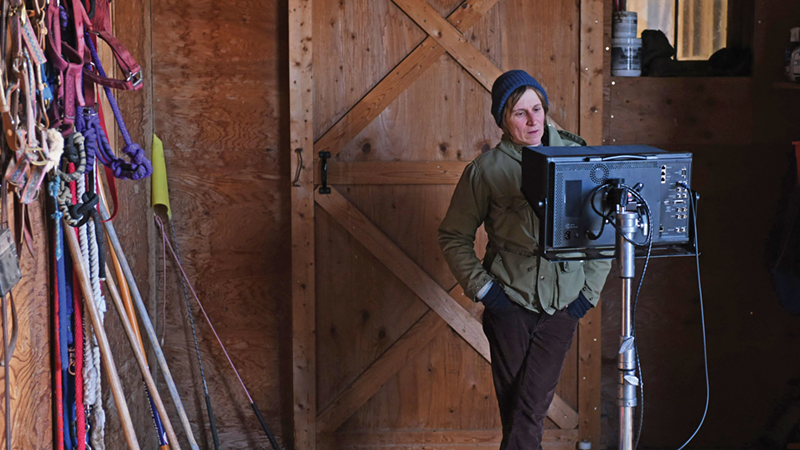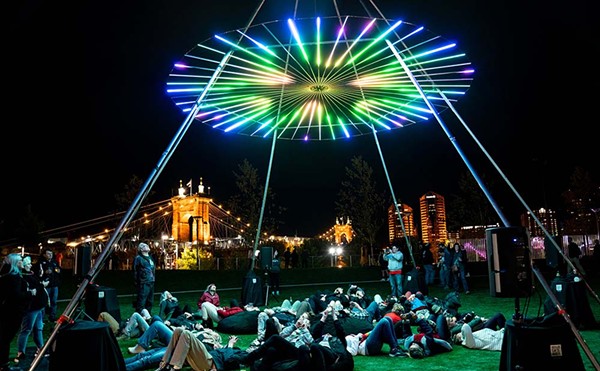Reichardt has emerged, over the course of the six features she has made since 1994’s River of Grass, as one of the most thoughtful and truly independent of all American directors. Her films especially leave room for quietude. Her 2006 Old Joy, about two men whose camping trip causes them to examine their souls, has become an indie classic; her work with Michelle Williams in 2008’s Wendy and Lucy and 2010’s Meek’s Cutoff has been heralded. Certain Women features Williams, Laura Dern and Kristen Stewart as women living in Montana.
I had seen the film a couple of days before my sit-down with Reichardt and was moved by how intimately it delved into the lives of its characters, and how its three distinct narratives found ways to bleed into one another, probing and exposing the inner thoughts that inspire the kind of secret movements that occur far from prying eyes.
As I made my way to Reichardt’s table at a hotel restaurant, among a mid-afternoon lunch crowd, she greeted me with a firm handshake and a question — really more of a comment — seeking to open a doorway into my headspace, my philosophical and political heart. The question was, more or less, “What’s going on?” It wasn’t specifically a judgment about Trump and his presidential campaign, but was about a concern that his supporters didn’t question the inaccuracies and the blatant inconsistencies in his positions. And I answered without reservation.
Reichardt instinctively knew or sensed a degree of commonality, but she would have been ready, if we had been on opposite sides, to still talk and reason her way through the ideological space between us.
We spoke off the record about that for almost 10 minutes. She wasn’t trying to hide from or avoid the task of promoting her film. No, this felt like two people slowly building trust before the work of professional communication could begin.
When I finally turned the recorder on, you could hear a quiet laugh that we shared, a resigned willingness to surrender, at last, to the task that brought us together. I asked her about the silence that surrounds the action in Certain Women and how it seems that she writes such silence into her film.
“I do think that the story lies between the dialogue and the characters and not what I write,” she acknowledged. “That’s what I’m drawn to in filmmaking — sort of the craft of it. I can use the image, where the camera goes and how people move through a scene to reveal things and keep it happening, so that (the movie) doesn’t just sit in the dialogue. But, even though it’s a quiet film, there’s a lot of sound design going on.”
I shared a belief that, in today’s world, we as a people, a film-going society, are not used to that. We’re used to dialogue, even if it’s inane dialogue, filling that space.
Later in our conversation, we drifted back to this idea of a sense of discomfort that can emerge among viewers when a film carves out space for its characters, its world, to be quiet. They might respond to it as an abyss.
“It’s OK for people to be a little uncomfortable,” Reichardt said. “At times, I want my escapism, also. But if I’m going to spend a couple years of my life making something, I want it to be interesting to me.”
Certain Women is based on a short story collection by Maile Meloy. “I am starting with a foundation,” Reichardt explained. “(The stories) have room where I can come in and spread things out, and make room for the day-to-day chores where the small twists of life come in. It’s amazing how you can really use quiet, and just changing the pace, to reveal tension. Sometimes, it feels like some radical act to be pulling against the way time wants us to react to something right now. I think that’s all based on commerce.”
Reichardt is in filmmaking for something other than commerce, but she navigates through the industry with her eyes, ears and mind wide open, attuned to every character and story before her. The industry would be wise to take note.
CONTACT TT STERN-ENZI: [email protected]






